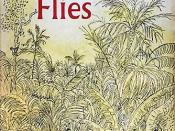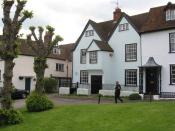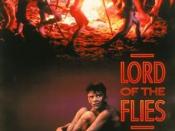William Golding was born into a rich family, and he devoted his studies to literature. When World War II started, he joined the navy. Golding himself admits that his experience in the navy made Golding lose his belief in the natural innocence of humanity, even in the innocence in children. His experiences in the navy inspired him to write his most famous book, Lord of the Flies.
Lord of the Flies is interesting and compelling to read because it is a realistic yet wicked look at humanities tendency to do evil, especially if there are no foreseeable consequences, symbolized in the book by the beast. 'What I mean is... Maybe it's only us.'... Simon became inarticulate in his efforts to express mankind's essential illness." (Golding 89) Its purpose, according to Golding, is to show the ineffectiveness of government. However, he illustrates this point in a very elaborate tale about a group of boys trapped on a deserted isle.
The characters in Lord of the Flies, while metaphorical and symbolic, are very descriptive and three-dimensional. While some characters are shown promoting what some would consider anarchy, and some characters are shown promoting what some would consider blind allegiance to old and useless laws, it is almost impossible to say which ideology is right and which one is wrong. This answerable question is made twice as complicated because both sides have reasonable arguments and motivations. "There was the brilliant world of hunting, tactics, fierce exhilaration, skill, and there was the world of longing and baffled common-sense." (Golding 71)
Lord of the Flies demonstrates how society and fear of punishment is one of the only things that keeps humanity from giving in to "the beast," which represents the darkest and most evil side of humankind. While the signal fire was going, most...


